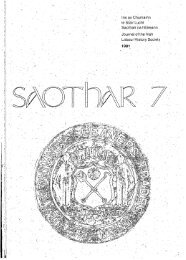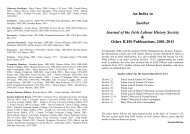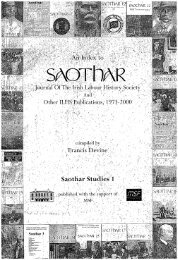Create successful ePaper yourself
Turn your PDF publications into a flip-book with our unique Google optimized e-Paper software.
ESSAYS' 81Fianna Fail and the Working Class:The Origins of the Enigmatic RelationshipIn his textbook Contemporary Irish Society. Michel Peillon comments on 'the astonishing capacityof Fianna Fail to hold on to such a wide range of support'. I This capacity is linked to its ability to elicitthe support of a majority of the working class whilst at the same time 'Fianna Fail policies correspondto the project of the bourgeoisie'. 2 Is it to be explained, as Peillon implies, by the 'blindness' of socialforces to their interests, produced by the large part that he claims ideology, particularly an ideology ofpopulist nationalism, plays in Irish politics? This begs the question of in what sense is ideology moreimportant in Ireland than in other countries, to which no answer is provided. More important, is therenot implied here, as in many other commentaries on the relationship between Fianna Fail: (FP) and theworking class, the notion that the working class has an interest which should lead it to support a socialistparty and that its failure to do so has been due to some process of mystification?What we have here is another example of teleological thinking about class which can be traced backto the distinction Marx once made between a 'class in itself and a 'class for itself'.3 According to thisview class exists as a reality at the economic level and this existence will ineluctably express itself inan appropriate form of political class consciousness. In this sense classes are seen as existing prior toclass struggles. The effect is to treat actual political and ideological struggles as secondary toPlatonically conceived class interests. In contrast to this, it will be suggested here that a moreappropriate approach is to treat class as an outcome of specific struggles rather than the pre-givenreality: 'Classes must be viewed as effects of struggles structured by objective conditions that aresimultaneously economic, political and ideological'.4 One element of these conditions is the strategyof left forces which can often contribute substantially to the continuing political domination andideological subjection of the working class.Apart from the theoretical problem there is a major empirical one: we still do not possess a scholarlyhistory of the dominant party in the Irish state. This will continue to be an obstacle for serious debateabout the politics and ideology ofthe working class. However the picture is not totally black. Over thelast two decades an increasing amount of work has been done which is relevant to our concerns. As Leenoted in Saothar 6, the development of Irish political science, political sociology and electoralgeography has transformed our grasp of electoral history.5 At its best, work by Garvin and Mairl' issensitive to the need to relate electoral patterns to economic and social change and the various effectsof such change on the electoral behaviour of different classes. Here the crucial and beneficial influenceof Rumpf' s social-geographical analysis of the national struggle and republicanism is obvious.?A major weakness of such work is its severe neglect of the role of the state. It was possession ofstate power for extended periods which allowed FP to develop and cement its hegemony over theworking class. The state itself was no monolith - as the site at which ruling strategies are elaborated,in Ireland as elsewhere, it was necessarily beset by fissures and conflicts. It was not until partial accessto state papers was granted to scholars that these types of division could begin to be examined, and evennow the restricted amount of material available limits what can be achieved. Nevertheless state papersremain a much under-worked source for those interested in specifying the elaboration of FP strategytowards social classes - apart from the working class there is the whole area of agrarian policy in the1930s and its implication for FP's constituency amongst small farmers. Access to new material willnot in itself be enough. Irish historians, and this includes labour historians, aversion to theoreticalquestions presents a continuing formidable obstacle.A more serious investigation of the elaboration and development of FF policies in crucialconjunctures like the early 1930s may well cause a reassessment of conventional wisdom about theparty and its relation to the working class. One of these is the notion that the history of the party is ofa movement from a leftist populist radicalism (1926-1938) to an increasingly centrist or conservativerole - Dick Walsh in his recent survey of the party's history entitles one of his later chapters 'Ireland's





